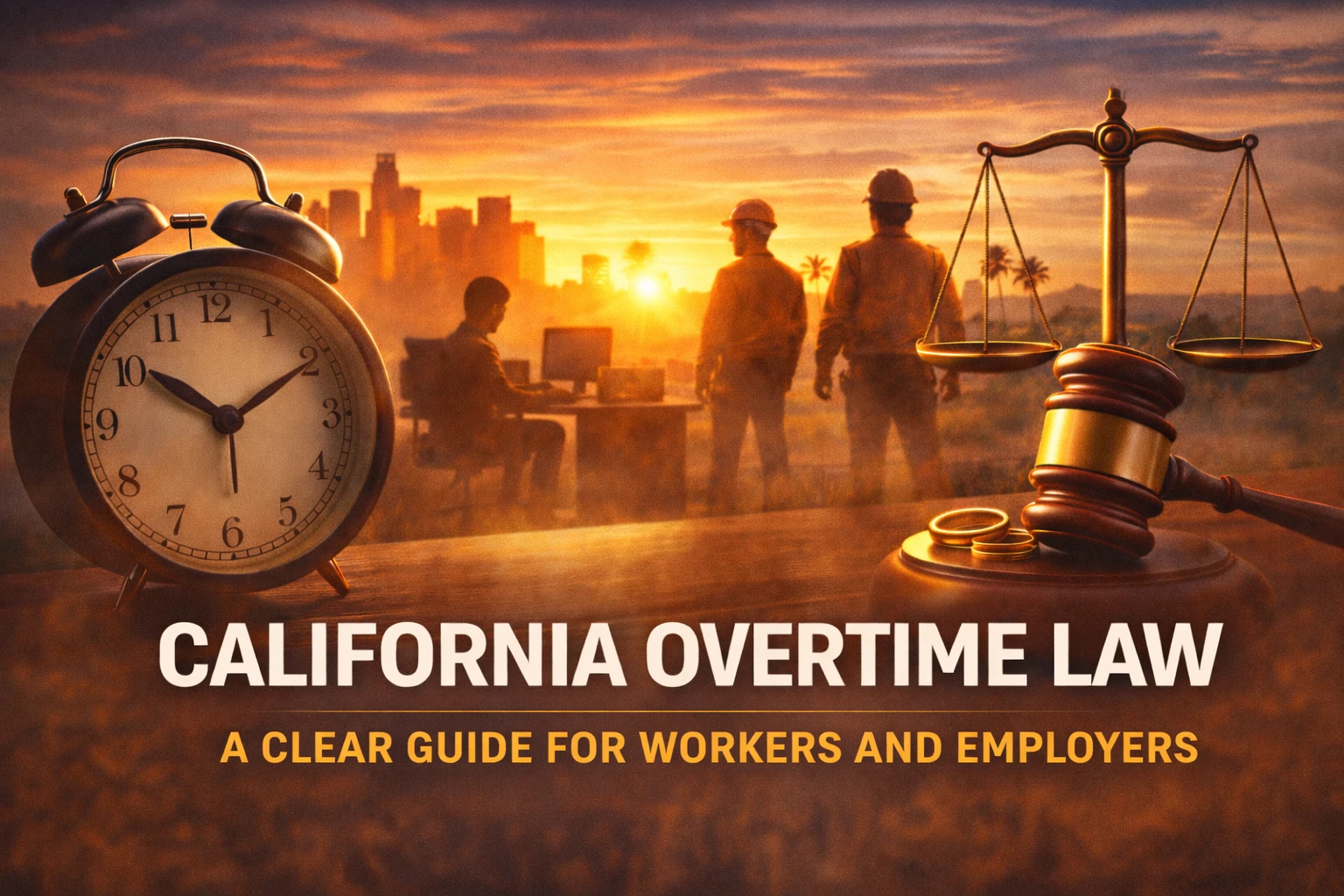Time at work should come with fair pay. California law protects this right. The state sets strong rules about overtime. These rules help workers earn extra when they work longer than usual.
Many people do not know the full details. Some think overtime only starts after 40 hours in a week. Others do not realize that daily hours also count. These small misunderstandings can lead to lost wages or legal trouble.
California gives more protection than federal law. It looks at both daily and weekly hours. The law also includes double pay in some cases. This keeps the work system fair for everyone.
This article explains how overtime works in California. It shows who gets it, when it starts, and how it’s paid. The goal is to help workers understand their rights and help employers follow the law.
When Overtime Starts
In California, overtime does not only depend on weekly totals. A worker can earn extra pay in a single day. That is one big difference from many other states.
A worker earns overtime after 8 hours of work in one day. If someone works more than 12 hours in a day, they earn double pay for those extra hours. Overtime also starts after 40 hours of work in a week.
If someone works all seven days in a row, the law gives extra pay on that seventh day. The first eight hours on that day earn time and a half. Any hours after that earn double time.
The law gives a clear system. Workers who go beyond normal limits get paid more. This helps prevent overwork. It also rewards the people who stay late and give extra effort.
Overtime Eligibility and Employee Classification
Not every worker earns overtime. The law splits jobs into two groups. These are non-exempt and exempt jobs.
Non-exempt workers earn hourly pay. Most retail workers, warehouse staff, and service employees fall into this group. These workers get overtime when they work extra hours.
Exempt workers do not get overtime. These jobs often pay a salary. The workers may manage others or handle special tasks. A job title alone does not make a worker exempt. The job must meet certain rules.
The exempt worker must earn at least a set amount each month. Their main job must require skill, judgment, or decision-making. They must also have control over how they do their job.
Some companies make mistakes in classifying jobs. That leads to unpaid overtime. Workers should know their status and ask questions if they have doubts.
Learn more about child safety laws in our guide on the California Booster Seat Law.
Overtime Pay Calculation and Rate Structure
Overtime pay starts with the worker’s regular hourly rate. The law uses this number to decide how much extra pay is owed.
Time and a half means the worker earns one and a half times their normal rate. A person who makes $18 per hour would get $27 during overtime. Double time means twice the rate. In that case, the pay would be $36 per hour.
A person who works 10 hours in one day gets regular pay for eight hours. The last two hours are paid at the higher overtime rate.
If someone works 13 hours, the first eight hours are paid at the normal rate. The next four hours are paid at time and a half. The final hour is paid at double time.
This extra pay must show up clearly on the worker’s paycheck. The employer must keep clean, honest records. If there is a mistake, the worker should report it right away.
Jobs With Different Rules
Some jobs follow special rules under state law. These rules may change the way overtime works.
Farmworkers have different limits. Overtime starts after nine hours in a day or 50 hours in a week. These numbers may change based on the size of the farm.
Some health care workers have flexible schedules. If they agree to a 12-hour shift, they may earn straight pay until they go beyond 12 hours.
Union jobs may follow contracts with different terms. The law still applies, but union deals may include some changes to overtime rules.
Workers who drive trucks or provide in-home care may also have different rules. These jobs follow other parts of the labor code.
Each job has its own standards. Workers should check with their employer or the state labor board if they are unsure.
Mistakes Employers Make
Some employers do not follow the rules. This may happen by accident or on purpose. Either way, workers lose money.
One common problem is classifying a worker as exempt when they are not. This means the worker does not get overtime even though they should.
Some companies ask workers to do tasks before or after clocking in. These hours count as work and must be paid. Failing to pay for training, travel, or prep time also breaks the law.
Other employers offer “comp time” instead of money. In most cases, this is not allowed in the private sector. Workers must receive pay, not time off, for overtime.
The law requires employers to pay on time. Workers who face delays or short checks have the right to file a complaint. The labor board can order the employer to fix the mistake and pay a fine.
You can also read our guide on the California Lemon Law Time Limit to understand your rights.
What Workers Can Do
Workers should keep track of their hours. A notebook or phone app can help. They should also check their pay stub for errors.
If something looks wrong, they can talk to a supervisor. If that does not help, they can contact the California Labor Commissioner’s Office. This office handles wage claims and protects workers.
A worker does not need a lawyer to file a claim. But in some cases, legal help may make the process easier. Some claims lead to back pay and extra penalties for the employer.
The law also protects workers from being fired or punished for speaking up. This is called retaliation, and it is illegal.
Workers have the right to ask questions and speak up without fear. That right is part of the labor code. No one should be punished for wanting fair pay.
Why the Law Matters
Overtime rules protect health, time, and fairness. They stop employers from pushing workers too hard. They reward people who work extra.
The law makes sure workers do not earn the same pay for extra hours. It values time and effort. That helps create balance between work and rest.
Fair pay also leads to better workplaces. It builds trust. It shows that the employer respects the worker’s time. It also helps workers support their families.
These rules are not just legal details. They shape daily life for millions of people. When followed, they keep jobs fair and safe.
Final Summary of California Overtime Law
California overtime law gives workers strong protection. It sets clear rules about when extra pay starts and how much it should be. It also tells employers how to stay fair and legal.
Workers should know their rights. They should track their time, check their pay, and speak up when something feels wrong. Employers should stay informed and treat workers with respect.
The goal is simple. People should earn fair pay for the time they give. This law helps make that happen. It protects workers, supports families, and creates a stronger work system for everyone.
Check our full guide on the California Tint Laws to learn the legal limits for vehicle window tinting.
Quick Answers
Q. When does overtime start in California?
Overtime starts after 8 hours in one day or after 40 hours in one week. It also starts on the seventh straight day of work.
Q. What is time and a half?
Time and a half means the worker gets paid 1.5 times their regular hourly rate.
Q. What is double time?
Double time means the worker earns twice their regular rate. This pay starts after 12 hours in a day or after 8 hours on the seventh day of work.
Q. Who qualifies for overtime pay?
Most hourly workers qualify. Some salaried workers may qualify too, depending on their job duties and pay.
Q. Do salaried employees get overtime in California?
Some do. If the job does not meet the rules for exempt status, the employer must pay overtime.
Q. What if my boss refuses to pay overtime?
You can file a wage claim with the California Labor Commissioner. You do not need a lawyer to do this.
Disclaimer:
This article is for general information only. It does not give legal advice. For help with your situation, contact a legal expert or the California Labor Commissioner’s Office.




